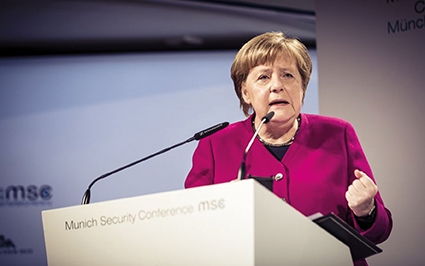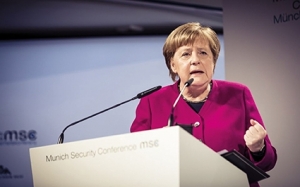The Munich Security Conference 2019 - Is NATO under Threat?
The underlying theme of this year’s Munich Security Conference over the weekend was the fragmentation of the world order. As US President Donald Trump directs the US’ withdrawal from multilateralism, some fear that bodies such as NATO could become a thing of the past.
The Munich Security Conference first took place at the height of the Cold War in 1963. Bringing together German leaders with NATO allies such as the US, it was designed to unite Western policy and strengthen mutual defense.
However, American foreign policy has dramatically shifted under President Trump as he withdraws the US from multilateral agreements and treaties, thus ending years of carefully constructed diplomacy with a late-night tweet. Trump has critized NATO, believing it imposes unfair financial burdens on the US. His words have been matched by action. His decision to abandon the Iran nuclear deal, as well as pulling back from conflicts abroad, have left European allies questioning who will step in to replace America’s influence.
Shifting American policies and multilateralism have become very apparent at the conference in Munich.
On Friday, NATO Secretary-General Jens Stoltenberg consistently answered different variations of the same question: Does Trump really still believe in NATO? “Every time I speak to President Trump, he tells me that he likes NATO,” he responded to one reporter. “And not only that he likes NATO, but that he’s 100%in favor of it”.
Nonetheless, other politicians are not convinced by Trump’s commitment to NATO and world order as we know it today. “The liberal world order appears to be falling apart,” wrote Wolfgang Ischinger, Chairman of the Munich Security Conference, in his introductory note. “We are experiencing an epochal shift: an era is ending, and the rough outlines of a new political age are only beginning to emerge”.
German Chancellor Angela Markel also spoke about multilateralism in her impassioned speech on Saturday. “Who can pick up the pieces of the world’s puzzle?” She questioned. “Only all of us together.”
Similarly, the director of China’s Foreign Affairs Commission, Yang Jiechi explained the key part of his speech in English: “History tells us that we can only realize our people’s dreams for a better life by upholding multilateralism and enhancing global cooperation”.
Lindsy Graham, Republican member of the US Senate Committee for Foreign Relations, defended Trump’s attack on multilateralism and the idea of “America First”. “The President can be a handful,” he said, “but so can all of you.” Graham insisted that Trump really wants “burden-sharing” among US allies.
Other attendees at the Munich conference continue to insist that there is still a strong alliance of “Western” countries who defend liberal values. Former state premier of Lower Saxony and now chairman of the European Parliament’s foreign affairs committee, David McAllister, underlined that common interests guided by values distinguish allies from autocratically governed states: “What unifies us is the commitment to democracy, the rule of law, free election, religious tolerance, equal rights for women and men.”
Moreover, he believes that Trump’s US is actually more committed to world order than it may seem. Indeed, over 50 members of the the US Congress attended the Munich Security Conference, suggesting that they are committed to NATO. “American politics consists not only of this president,” he told German news outlet Deutsche Welle.
A key topic of this year’s conference was the security threat posed by Russia, their illegal activity, and disregard of international borders and sovereignty. NATO and its allies must step up and unite to ensure that democratic values are withheld. With the situation in Abkhazia and South Ossetia, this is especially important in Georgia, as well as the rest of the world.
Many countries demonstrated a strong alliance to NATO during the conference. Indeed, Gavin Williamson, the UK’s Secretary of State for Defense, said in his speech that “for the sake of our values, allies and friends, we will continue to lead in NATO… And let us not forget that the reason wethat will invest in our defense is to deliver a more peaceful, a more prosperous, and a more just world.” Whether Trump’s actions will speak louder than his words and how this will continue to effect the world, remains to be seen.
By Amy Jones
Image source: Munich Security Conference












